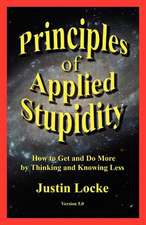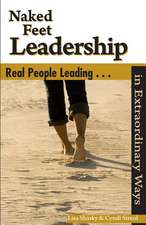Women and Leadership Development in College: A Facilitation Resource
Editat de Jennifer M. Pigza, Julie E. Owen, Associatesen Limba Engleză Paperback – 20 sep 2021
| Toate formatele și edițiile | Preț | Express |
|---|---|---|
| Paperback (1) | 207.51 lei 6-8 săpt. | |
| Taylor & Francis – 20 sep 2021 | 207.51 lei 6-8 săpt. | |
| Hardback (1) | 992.61 lei 3-5 săpt. | |
| Taylor & Francis – 13 oct 2021 | 992.61 lei 3-5 săpt. |
Preț: 207.51 lei
Preț vechi: 244.69 lei
-15% Nou
Puncte Express: 311
Preț estimativ în valută:
39.71€ • 43.27$ • 33.46£
39.71€ • 43.27$ • 33.46£
Carte tipărită la comandă
Livrare economică 24 aprilie-08 mai
Preluare comenzi: 021 569.72.76
Specificații
ISBN-13: 9781642670134
ISBN-10: 1642670138
Pagini: 192
Dimensiuni: 222 x 285 x 13 mm
Greutate: 0.34 kg
Ediția:1
Editura: Taylor & Francis
Colecția Routledge
Locul publicării:Oxford, United Kingdom
ISBN-10: 1642670138
Pagini: 192
Dimensiuni: 222 x 285 x 13 mm
Greutate: 0.34 kg
Ediția:1
Editura: Taylor & Francis
Colecția Routledge
Locul publicării:Oxford, United Kingdom
Public țintă
Postgraduate and Professional Practice & DevelopmentCuprins
Foreword—Paige Haber-Curran and Daniel Tillapaugh Preface Acknowledgments How to Use This Resource Section One. A Critical Moment for Women & Leadership 1.1 Dominant Ideologies and Hegemonic Mechanisms Impacting Women’s Leadership—R.J. Youngblood 1.2 Understanding the Terminology of Gender—Daniel Tillapaugh 1.3 Reviewing the Three (Four?. Waves of Feminism—Heather D. Shea 1.4 “Add Women, Change Everything”. Disrupting the Leadership Story Most Often Told— Natasha T. Turman and Shamika KariKari Section Two. Who am I to Lead? The Role of Identity, Intersectionality, and Efficacy in Leadership Development 2.1 Developing Leadership Efficacy Through Critical Self-Reflection— Melissa Rocco 2.2 The Puzzle of Predecessors, Instigators, and Inheritors—Katherine Quigley 2.3 The Johari Window. A View Into Leadership—Aoi Yamanaka and Sharrell Hassell-Goodman 2.4 Identity and Intersectionality in Leadership— Arnèle Francis and Rukan Said 2.5 Leadership Identity Development. Letter to My Future Self—Erika Cohen-Derr Section Three. How Did We Get Here? How Gender Socialization Shapes Women in Leadership 3.1 Key Concepts of Gender Socialization and Media Influences—Paige Haber-Curran and Grisell Pérez-Carey 3.2 The Mythical Norms of Leadership—Adrian Bitton and Danyelle Reynolds 3.3 Formative Influences Shaping Women’s Leadership. Gender Socialization Timeline—Paige Haber-Curran 3.4 Personal Leadership Fairy-Tale Rewrite—Misty Krell Section Four. Feminine or Feminist Approaches? Leading Across Campus and Community 4.1 The Role of Men and Gender-Nonconforming Individuals in Feminist Leadership—Keith E. Edwards 4.2 Cross-Cultural Issues and Opportunities in Leadership—Aoi Yamanaka 4.3 Gender and Leadership in Non-Western Cultures—Aoi Yamanaka 4.4 Exercising Feminine & Feminist Leadership. A Storytelling and Echoes Experience—Jennifer M. Pigza Section Five. What Difference Does Difference Make? The Effects of Stereotypes, Prejudice, and Discrimination on Representation and Leadership 5.1 The Gender Wage Gap—Cher Weixia Chen 5.2 The Effects of Stereotypes, Prejudice, and Discrimination on Women’s Leadership—Graziella Pagliarulo McCarron 5.3 A Critical Reflection of Gender Bias in Leadership—Leigh Amadi Dunewood, Natasha H. Chapman, and Stephanie Chang 5.4 Exploring Different Forms of Resistance to Women’s Leadership. An Exercise in Terminology—Julie E. Owen Section Six. Navigating Organizations and Systems. Metaphors for Women in Leadership 6.1 Applying a Critical Lens. Why Can’t Women Just Lean In?—Amy C. Barnes 6.2 Environmental Scans and Communal Change—Megan J. Hennessey 6.3 On-Ramps and Off-Ramps. Narratives of Professional Journey—Graziella Pagliarulo McCarron and Jennifer M. Pigza 6.4 Personal Leadership Labyrinths—Julie E. Owen Section Seven. Beware of Precarious Pedestals. De-Gendering Leadership 7.1 Dominant Narratives and Counternarratives. De-Gendering Leadership—Daniel Tillapaugh 7.2 Engaging a Critical Lens on Gender to Enact Change in Leadership—Trisha Teig and Kathy L. Guthrie 7.3 Gendered Leadership, Precarious Pedestals, and Beyond—Adrian Bitton and Danyelle Reynolds 7.4 Personal Narratives of Gender and Leadership. A Modified Fishbowl Conversation—Jennifer M. Pigza Section Eight. Reimagining Women and Leadership. Strategies, Allies, and Critical Hope 8.1 Developing a Liberatory Consciousness—Michaela Daystar 8.2 Social Change and Inclusive Social Movements. A Case Study—Adrian Bitton and Danyelle Reynolds 8.3 Leadership Action Plan. Committing to the Struggle and Sustaining Critical Hope—Maritza Torres and Erica Wiborg 8.4 Practicing Critical Hope in Leadership—Nolizwe M. Nondabula and Karin M. Cotterman 8.5 Diverse Levers for Social Change and Personal Action—Kristen Wright 8.6 Two-Minute Speeches Inspired by “Ain’t I a Woman?”—Arnèle Francisand Rukan Said About the Authors Index
Notă biografică
Jennifer M. Pigza is Director of the Catholic Institute for Lasallian Social Action, the center for community engagement and place-based justice at Saint Mary’s College of California, where she is also an adjunct assistant professor of leadership. She is co-editor of Leadership Development through Service-Learning (New Directions for Student Leadership series) and is founding co-editor of the journal Engaging Pedagogies in Catholic Higher Education (EPiCHE). Her writing and practice focus on critical pedagogy, leadership development through community engagement, and organizational leadership. Julie Owen, PhD, is Associate Professor of Leadership Studies at the School of Integrative Studies, George Mason University, where she coordinates the leadership studies major and minor, and is affiliate faculty with the Higher Education Program, and with Women and Gender Studies. Owen has authored over 30 publications, including serving as co-editor of the Handbook for Student Leadership Development, and editor of Innovative Learning for Leadership Development (New Directions for Student Leadership Series No.1). Daniel Tillapaugh, PhD, is assistant professor and chair in the Department of Counselor Education at California Lutheran University, where he primarily teaches in the Counseling and College Student Personnel Program. A graduate of the University of San Diego with a PhD in leadership studies, the University of Maryland with a MEd in counseling and personnel services, and Ithaca College with a MusB in music with an outside field of sociology, he worked as a student affairs administrator for 10 years before becoming a full-time faculty member. His research interests include intersectionality and student development in higher education, college men and masculinities, and college student leadership development and education. From 2012 to 2016, he served as the chair for the Coalition on Men and Masculinities, an entity group of ACPA–College Student Educators
Recenzii
From the Foreword:
“This book is a testament to [the editors’] commitment to helping all students -- but centering women, in particular -- think critically about the ways gender and leadership are intertwined in systems of power, privilege, and oppression. The lessons provided in this text promise to serve as powerful learning experiences for learners to gain critical self-awareness around their own identities and leadership practice. This text is a gift to the field of leadership education and will undoubtedly empower and help prepare the next generation of leaders in our society. ”
Paige Haber-Curran, associate professor at Texas State University; and Daniel Tillapaugh, associate professor at California Lutheran University
“This book is a testament to [the editors’] commitment to helping all students -- but centering women, in particular -- think critically about the ways gender and leadership are intertwined in systems of power, privilege, and oppression. The lessons provided in this text promise to serve as powerful learning experiences for learners to gain critical self-awareness around their own identities and leadership practice. This text is a gift to the field of leadership education and will undoubtedly empower and help prepare the next generation of leaders in our society. ”
Paige Haber-Curran, associate professor at Texas State University; and Daniel Tillapaugh, associate professor at California Lutheran University
Descriere
As leadership educators shift from teacher- to learner-centered environments, from hierarchical to shared responsibility for learning, and from absolute to constructed ways of knowing, a desire for new inclusive and creative pedagogies is also emerging.






















